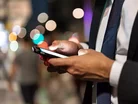Mastercard partners with Facebook: sending money in Brazil

WhatsApp users in Brazil can now transfer money and pay businesses directly from the app, quickly, conveniently and securely.
Today, Mastercard announced the extension of its partnership with Facebook to offer a new and innovative way for Brazilians to send and receive money from friends and family on the WhatsApp application. Mastercard cardholders banking with Nubank and Sicredi are among the first in Brazil to experience payments on WhatsApp. Additional banking partners are expected to join the program soon.
Leveraging Mastercard Send, millions of WhatsApp users can now use their phones to simply and easily transfer money instantly (24 hours a day, 7 days per week). As social distancing measures propel consumers to seek alternative, touch-free payment methods, consumers can use WhatsApp to transfer money and make and receive payments seamlessly, securely and in a contact-free way.

Paying friends and family just got easier
Person-to-person payments (P2P) are experiencing significant growth across the world, driven by technologies and mobile platforms that consumers enjoy using at little-to-no cost to them. Globally, domestic P2P transfers are expected to reach more than $2.07 trillion in volume by 2022.
Until now, the P2P user-experience in Brazil was cumbersome and time consuming. Consumers had to identify money transfer services and provide bank account information for recipients, who could wait days to receive funds. With the enablement of P2P payments on WhatsApp, Brazilians will be able to send and receive money conveniently and securely by registering their debit card through the most popular instant messaging app in the country, eliminating the risks and inefficiencies associated with other payment methods including cash.
The new solution responds to the needs of Brazilians who are increasingly looking for quick and safe ways to send and receive money, whether it is to reimburse a friend for a meal, to pay a roommate for rent, or simply lend money to a family member.
The inclusion of small businesses in electronic payments
In addition to making transfers, WhatsApp users can also pay small businesses through the WhatsApp Business Application. This allows for instant digital payments of goods and services to millions of small businesses in Brazil. Mastercard cardholders can register their credit or debit card to make their purchases securely. According to a recent study, 60% of Brazilian consumers already use WhatsApp to interact with small businesses, be it to order products, negotiate prices or schedule appointments. Enabling payments through WhatsApp will now allow consumers to complete the shopping journey with their favorite businesses without leaving the application.
“Adding a payment functionality to WhatsApp is a logical evolution to answer the needs of both consumers and small businesses in Brazil. The possibility to make purchases from small merchants through WhatsApp will support millions of local businesses which have been heavily impacted by the recent crisis as well as meet the demands for Brazilian of users who are looking to send payments to their friends and family each day”, said Kiki Del Valle, Senior Vice President, Digital Partnerships, Mastercard Latin America and Caribbean.
“We are very excited to bring payments on WhatsApp to our users across Brazil. Making it easier to send and receive money could not be more important than at a time like this,” said Matt Idema, WhatsApp’s Chief Operating Officer. “Small businesses are the backbone of the country. The ability to easily make sales right within WhatsApp will help business owners adapt to the digital economy and to support growth and financial recovery.”
Security in every WhatsApp payment transactions
Linking their preferred credit or debit card within the app is highly secure thanks to the use of Mastercard’s state-of-the-art tokenization solution. The tokenization technology protects cardholder information by replacing the original 16-digit card number with a unique alternative number, or “token,” which is associated with each WhatsApp user’s individual account and not functional elsewhere. Once the token has been created, consumers will need to input their security PIN each time they want to perform a transaction.

